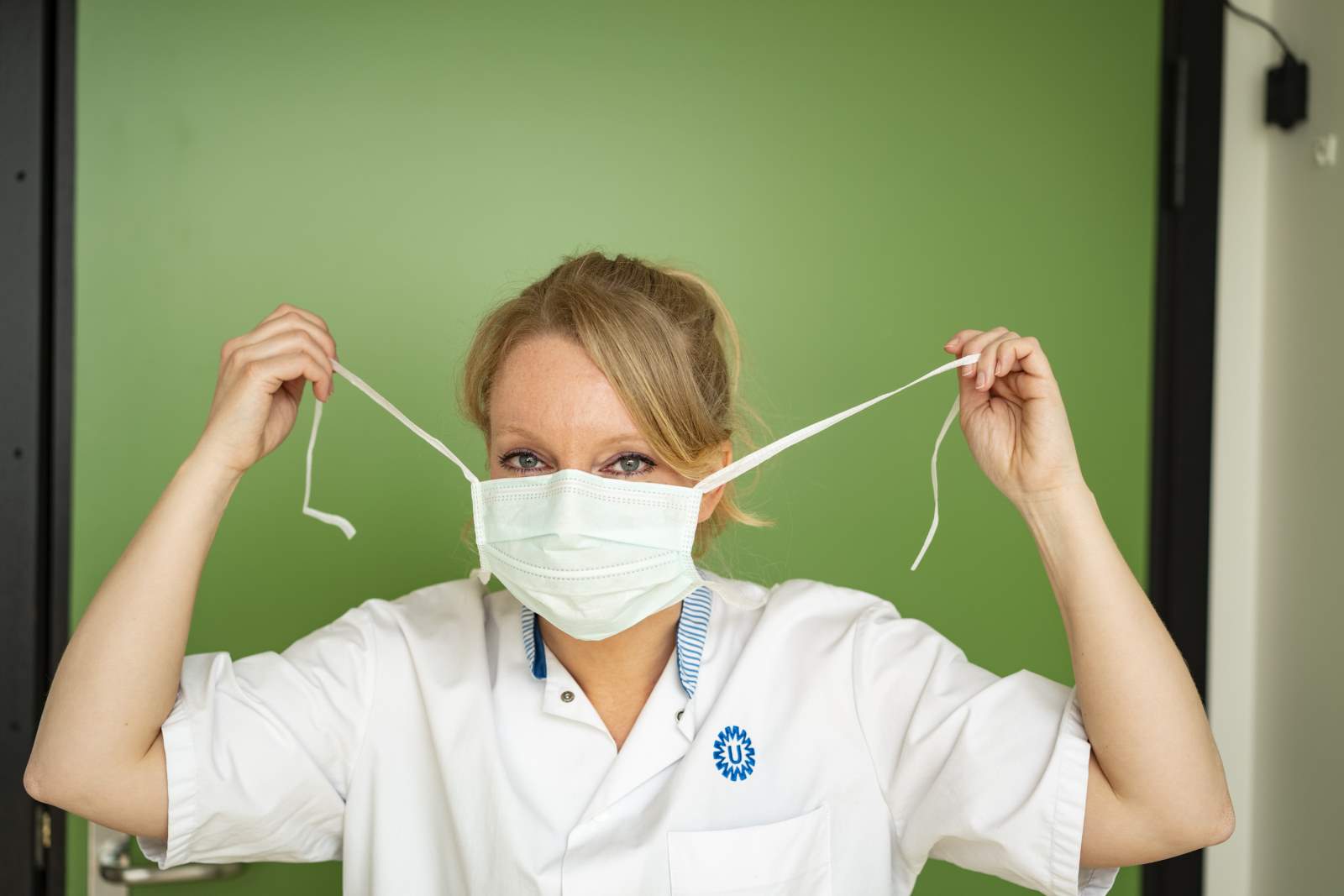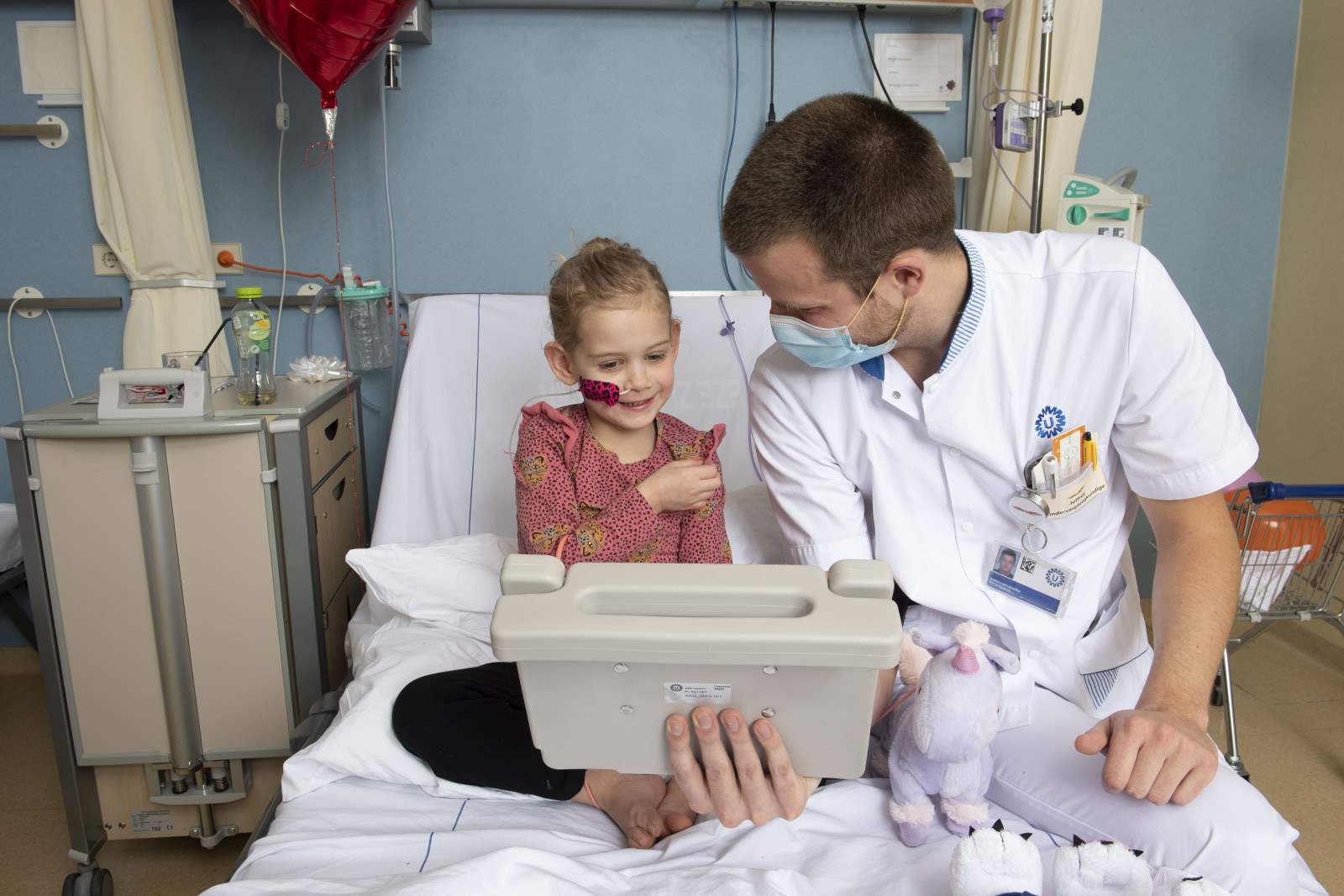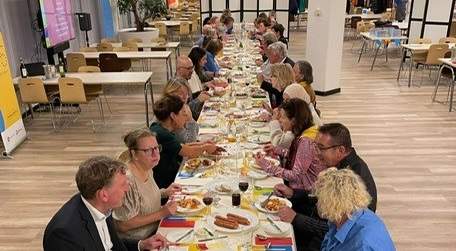What characterized 2021?
Besides the developments that we highlight for our various target groups in this report, there is a number of topics that received attention throughout the year and/or throughout the organization. Matters that for us characterized 2021. We shall single out a few.

The impact of COVID-19
We cannot deny it: in 2021, for the second year in a row, COVID-19 had an enormous impact on our patients and our employees. Due to the large influx of coronavirus patients, many regular treatments were once gain scaled down and postponed countrywide. To deliver COVID-19 care, as in 2020 we once again worked closely with the Ministry of Defense .
Among other things, UMC Utrecht ensured that 1,455 general practitioners in the Utrecht region , patients, and of course all our employees could be vaccinated fast. Our pharmacy served as hub in the vaccination program within UMC Utrecht but also for other hospitals in the region. Over three million people in the Netherlands watched the special NOS broadcast from UMC Utrecht on January 5, 2021, on the eve of the national vaccination campaign. Together with Utrecht University and LAREB, UMC Utrecht also coordinates research into vaccine safety in the Netherlands and eight other European countries. Together with other UMCs, UMC Utrecht furthermore answers telephone queries from people who are doubting whether to take a COVID-19 vaccine. At the end of 2021, this initiative became the national ‘Vaccinatie Twijfeltelefoon’ (‘vaccination doubt line’) . Our nurses and doctors also went into the neighborhood to inform people about vaccination.
With for instance the REMAP-CAP study we made a big contribution to gaining insights on the treatment of seriously ill COVID-19 patients. In addition, we studied (the effect of) vaccinations for various groups of people, including patients with immune defects , people with Down syndrome , and vulnerable elderly people .
We made a big contribution to gaining insights on the treatment of seriously ill COVID-19 patients
An important topic in 2021 was catchup care. Her Majesty Queen Máxima visited UMC Utrecht in June 2021 in relation with this care that we provide after earlier treatment had to be postponed due to COVID-19. She spoke with the Executive Board, specialists, an IC nurse, and a patient about the impact of postponed and catchup care.
All in all, the pressure was high on all employees in 2021, and more specifically of course on those involved in care. It was an ongoing challenge to work out schedules. On the one hand due to the influx of COVID-19 patients, and on the other hand, due to sick leave that was higher than usual in 2021, just like in 2020. Many colleagues made an extra effort to fill gaps in timetables. Sometimes our health workers had to make concessions on the quality that they are used to delivering. In discussions with care providers, we saw and experienced that risks were careful weighed up in this regard. Colleagues with office jobs mostly worked from home. For them too, it was a busy, challenging, and sometimes difficult year. In 2021, as in 2020, we paid extra attention to psychosocial pressure and offered additional support in this respect.
Research could sometimes not continue (effectively), and most of the education for our students unfortunately had to take place remotely. Colleagues made considerable efforts to ensure the continuity and quality thereof. This also put further pressure on the wellbeing of our students, to which we were even more attentive than usual.
We now know that COVID-19 is here to stay, and have integrated COVID-19 care in our regular health care. We have also arranged our organization and education in such a way that we shall be better able in the future to deal with situations like pandemics and the changing expectations of employees and students. We are therefore working in an increasingly interdisciplinary way, regionally, countrywide, and internationally.
Longterm outlook on care: we deliver care at home, unless
A successful implementation of our Connecting Worlds strategy requires a longterm outlook on care. In 2021, we developed this outlook with a large group of in-house professionals. Our longterm vision indicates our direction for the future: we deliver care at home, unless. This helps us to make choices. And together, step by step, to give shape to our care, research and education of the future.
We deliver care at home, unless. This helps us to make choices. And together, step by step, to give shape to our care, research and education of the future

All the developments around us (also in terms of digitalization and artificial intelligence) require a new role from us: Not we as care providers, but those who require care have an information advantage and will determine and control where, when, and with whom care will be obtained. We become a partner and a coach, helping people with what to do with information rather than determining the information. In time, people will only come physically to a hospital if there is no other solution. For example, for acute and complex care. We also support and monitor patients at home, often virtually. The focus here is on preventative care. New innovations make ultra-personalized care the standard. Our role as a university center is to stay ahead in research and education, and in the application of this increasingly complex care. Colleagues with a variety of medical and non-medical disciplines will eventually work together as one team – on a regional, national and international scale. And, together with our network partners, we shall organize accessible care for everyone. To remain impactful also in the future, we must make choices and stay agile. And organize ourselves fully around citizens, data and sustainability. . Together with our partners, we add value to people’s lives, because every person counts – now and in the future!
Lustrum: 385 years of science in Utrecht
In 2021, together with Utrecht University, we are celebrating 385 years of science in Utrecht. With the theme for the lustrum, ‘Creating tomorrow together’, we are inviting students, employees, alumni and inhabitants of the city of Utrecht to think together about the future. Especially at a time when there was less physical connection in society, we used the lustrum to seek connection. We organized and encouraged unusual get-togethers and cooperation where people paid attention to each other.
One of the activities of the lustrum was to draw up the Utrecht Science Agenda . With the motto ‘One question can change the world’, we asked the people of Utrecht which question they would like to see answered. Over 1,200 people sent in their questions, and we talked about it with a diverse group of inhabitants.All these questions gave us an idea of what was going on the city, ideas, concerns, and dreams. Many of their questions were about sustainability, a healthy life in the city, and climate change. A selection of these questions will now form the basis for the Utrecht Science Agenda. In this way we can align our research even better with what the city needs.

We also sought connection by supporting ‘Grote Utrecht Stadsdiner’ (‘Great Utrecht City Dinner’) . During this initiative on the International Day for the Eradication of Poverty, thousands of Utrecht inhabitants from a variety of age groups and social backgrounds gathered around a table as one big family, in various places in the city. At UMC Utrecht, we spent the evening with a group of guests: patients of UMC Utrecht, our Client Council, representatives of the Ondiep food bank and Foundation Rechtop (promoting the interests of the homeless), and other town citizens. In addition, we distributed meal parcels to colleagues at UMC Utrecht so that they could share a meal and stories with guests at home.Because eating together connects people.
We find it important to be and to stay connected with the city and its inhabitants. That is why both of these have become longterm initiatives and we are going to continue with them in the future.
Friends of UMC Utrecht & Wilhelmina Children's Hospital
Friends of UMC Utrecht & Wilhelmina Children’s Hospital is a worthy cause of our (children’s) hospital. Via the Friends, new treatments and innovations in health care are financed. The Friends also make an effort to render all patients’ stay as pleasant as possible.
The Friends also make an effort to render all patients’ stay as pleasant as possible
In 2021, thanks to gifts from donors, companies, funds, foundations and wills, a total of EUR 5.2 million was raised. A campaign was for instance started for a parent lounge at the new Intensive Care (IC) unit at Wilhelmina Children’s Hospital . In total, through a variety of actions, over EUR 150,000 was raised, and the parent lounge is getting closer and closer to becoming a reality. In addition, thanks to a bequest, five promising ideas for cancer research could be brought to fruition , further improving the prospects of patients. Big strides were also made in pediatric heart research at Wilhelmina Children’s Hospital . A total of over EUR 75,000 was raised for this. In the scope of the lustrum 385 years of science in Utrecht, a mobile living room was also created. The mobile living room gives a friendly atmosphere to the typical hospital room. Patients with incurable diseases who can no longer be displaced or who do not want to be displaced, can thus say goodbye to their dear ones in homely surroundings.